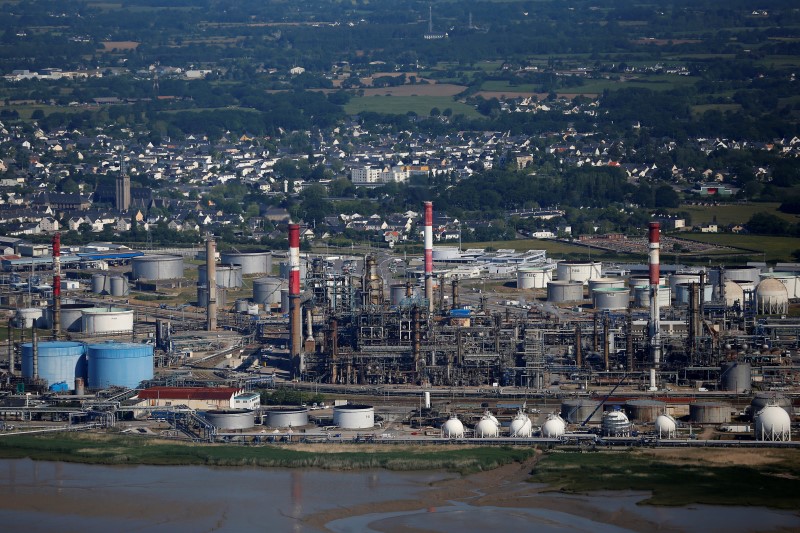(Adds Eni's comment)
ABUJA, July 24 (Reuters) - Nigeria's state oil firm said on
Wednesday it had suspended cash call repayments to Eni ENI.MI
for three months and did not plan to renew some of the Italian
firm's asset licences.
The Nigerian National Petroleum Corporation (NNPC) owes
billions of dollars to international oil companies, including
Eni, its share of operating costs for their joint ventures. Of
the original $5 billion owed two years ago, repaid through a
system known as cash calls, about $3 billion is now outstanding.
But NNPC has withheld three months' payment to Eni over a
set of disputes. Delayed payments for the cash calls have
hindered development of some of the country's oil assets.
Among the issues raised by NNPC are that Eni's licences for
some oil assets have expired, but Nigeria's government does not
plan to renew them as it wants the state oil firm to take over.
The Nigerian firm did not specify which of Eni's licences it
would not renew.
"The failure to pay cash call arrears in the last three
months was deliberate and meant to ensure that the issues
surrounding the agreement (are) settled," the NNPC said in a
statement, adding it has the money to pay and expects a
resolution by the end of the week.
Eni said in a statement the "issue of arrears ... has
briefly been dealt with over the course of a very warm and
constructive meeting with the new management of NNPC."
President Muhammadu Buhari in June appointed Mele Kyari, a
geologist, to head NNPC. Kyari is also Nigeria's representative
at the Organization of the Petroleum Exporting Countries.
"The cause of the delay in payment was identified as a
technical one and NNPC agreed to resume payments," Eni said.
NNPC urged Eni to complete the first phase of rehabilitating
Nigeria's Port Harcourt refinery by the scheduled date of
October, the statement said.
It added that Eni's executive vice chair for sub-Saharan
Africa, Brusco Guido, said the Italian firm listed a number of
challenges that had hampered its operation and asked NNPC to
help resolve them in order to meet its target of growing the
joint ventures' oil production by 30% over last year's rate.
- English (USA)
- English (UK)
- English (India)
- English (Canada)
- English (Australia)
- English (South Africa)
- English (Philippines)
- Deutsch
- Español (España)
- Español (México)
- Français
- Italiano
- Nederlands
- Português (Portugal)
- Polski
- Português (Brasil)
- Русский
- Türkçe
- العربية
- Ελληνικά
- Svenska
- Suomi
- עברית
- 日本語
- 한국어
- 简体中文
- 繁體中文
- Bahasa Indonesia
- Bahasa Melayu
- ไทย
- Tiếng Việt
- हिंदी
UPDATE 1-Nigeria's state oil firm has not paid Eni's cash call payments for three months
Published 24/07/2019, 23:50
UPDATE 1-Nigeria's state oil firm has not paid Eni's cash call payments for three months

Latest comments
Install Our App
Risk Disclosure: Trading in financial instruments and/or cryptocurrencies involves high risks including the risk of losing some, or all, of your investment amount, and may not be suitable for all investors. Prices of cryptocurrencies are extremely volatile and may be affected by external factors such as financial, regulatory or political events. Trading on margin increases the financial risks.
Before deciding to trade in financial instrument or cryptocurrencies you should be fully informed of the risks and costs associated with trading the financial markets, carefully consider your investment objectives, level of experience, and risk appetite, and seek professional advice where needed.
Fusion Media would like to remind you that the data contained in this website is not necessarily real-time nor accurate. The data and prices on the website are not necessarily provided by any market or exchange, but may be provided by market makers, and so prices may not be accurate and may differ from the actual price at any given market, meaning prices are indicative and not appropriate for trading purposes. Fusion Media and any provider of the data contained in this website will not accept liability for any loss or damage as a result of your trading, or your reliance on the information contained within this website.
It is prohibited to use, store, reproduce, display, modify, transmit or distribute the data contained in this website without the explicit prior written permission of Fusion Media and/or the data provider. All intellectual property rights are reserved by the providers and/or the exchange providing the data contained in this website.
Fusion Media may be compensated by the advertisers that appear on the website, based on your interaction with the advertisements or advertisers
Before deciding to trade in financial instrument or cryptocurrencies you should be fully informed of the risks and costs associated with trading the financial markets, carefully consider your investment objectives, level of experience, and risk appetite, and seek professional advice where needed.
Fusion Media would like to remind you that the data contained in this website is not necessarily real-time nor accurate. The data and prices on the website are not necessarily provided by any market or exchange, but may be provided by market makers, and so prices may not be accurate and may differ from the actual price at any given market, meaning prices are indicative and not appropriate for trading purposes. Fusion Media and any provider of the data contained in this website will not accept liability for any loss or damage as a result of your trading, or your reliance on the information contained within this website.
It is prohibited to use, store, reproduce, display, modify, transmit or distribute the data contained in this website without the explicit prior written permission of Fusion Media and/or the data provider. All intellectual property rights are reserved by the providers and/or the exchange providing the data contained in this website.
Fusion Media may be compensated by the advertisers that appear on the website, based on your interaction with the advertisements or advertisers
© 2007-2025 - Fusion Media Limited. All Rights Reserved.